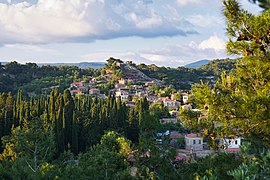Adatepe, Ayvacık
Adatepe | |
|---|---|
 View of Adatepe | |
| Coordinates: 39°34′10″N 26°37′10″E / 39.56944°N 26.61944°E | |
| Country | Turkey |
| Province | Çanakkale |
| District | Ayvacık |
| Elevation | 280 m (920 ft) |
| Population (2021) | 396 |
| Time zone | UTC+3 (TRT) |
| Postal code | 17980 |
| Area code | 0286 |
Adatepe is a village in the Küçükkuyu belde, in Ayvacık District of Çanakkale Province in northwestern Turkey.[1] Its population is 396 (2021).[2] The village was revived in the 1980s when the traditional stone houses were restored by people seeking to escape city life.
Location
[edit]The village is situated 280 m (920 ft) above sea level on the western foothill of Mount Ida (Turkish: Kaz Dağı) north of Edremit Gulf in Biga Peninsula.[3] It is 105 km (65 mi) from the province center Çanakkale, 35 km (22 mi) from district center Ayvacık.
History
[edit]Up on a hill overlooking the environs and the Edremit Gulf with the islands off Ayvalık and Lesbos, a historical site is situated with a stone chamber and water-filled cistern attributed as a Zeus altar. It is believed that according to Homer's epic poem Iliad, king of the gods Zeus watched the Trojan Wars from this place.[4]
Historically, the village was co-inhabited by Greeks in Turkey and Turks.[3] In 1905, around 600 Orthodox Greeks lived in the village, where a church named "Koimēsis tēs Theotokou" (Greek for "Dormition of the Mother of God") stood. The village was named Adatepe in 1912.[5] It was one of the places in Turkey where Greeks and Turks lived together and shared their cultures.[3][6] Locals reported there was a continued Turkish tradition since Seljuk times in the village as well as a Greek lifestyle the Turkish population lived with tin the Greek structures.[6] During the population exchange between Greece and Turkey by 1924, Muslim Cretan Turks settled replacing the Greek Orthodox population in the village.[4][6]
Village
[edit]The buildings in the village have Greek and Turkish architecture.[6] The original houses in the village are made of stone, and have two stories in general. All houses have a courtyard and a garden. The village is surrounded by olive groves. In the 1980s, a group of people, who escaped the big city life, came to Adatepe, which was about to turn into a ghost town towards the end of the 1980s.[6] People from Ankara, İzmir and mostly from Istanbul purchased buildings, which could be regarded as ruined, and converted them into living spaces by keeping their traditional Greek and Turkish architecture.[6] Today, the newcomers and the locals live in harmony.[4][6] The total houses in the village number 380,[7] and Adatepe was declared in 1989 an urban protected area of first grade, being the only one with this status in the region.[3][4]

Economy
[edit]Some of the more than a hundred restored stone buildings are used as tourist accommodation. Around two hundred thousand tourists visit Adatepe yearly.[6]
In Küçükkuyu, there is the Adatepe Olive Oil Museum located near the village,[7] which produces cold-pressed olive oil and olive oil-based soaps scented with lavender, laurel and rosemary.[8] The olive-based diverse products, of which packagings are adorned with a Greek girl picture,[7] are also exported.[9]
References
[edit]- ^ Köy, Turkey Civil Administration Departments Inventory. Retrieved 1 March 2023.
- ^ "Address-based population registration system (ADNKS) results dated 31 December 2021" (XLS) (in Turkish). TÜİK. Retrieved 1 March 2023.
- ^ a b c d "Adatepe Köyü" (in Turkish). Küçükkuyu. Retrieved 27 March 2021.
- ^ a b c d "Adatepe Köyü" (in Turkish). Ayvacık Kaymakamlığı. Retrieved 27 March 2021.
- ^ "Adatepe" (in Turkish). Nişan Yer Adları. Retrieved 27 March 2021.
- ^ a b c d e f g h "Mimarisini koruyan Adatepe, virüsten de koruyor". Hürriyet (in Turkish). 11 May 2020. Retrieved 28 March 2021.
- ^ a b c Okur, Meliha (19 December 2006). "Adatepe dörtlüsünün asırlık marka yolculuğu". Sabah (in Turkish). Retrieved 29 March 2021.
- ^ "Ürünlerimiz" (in Turkish). Adatepe. Retrieved 29 March 2021.
- ^ "1 dolarlık Adatepe sabunu Japonya'da 17 dolara satılıyor". Hürriyet (in Turkish). 30 August 2003. Retrieved 29 March 2021.


 French
French Deutsch
Deutsch
